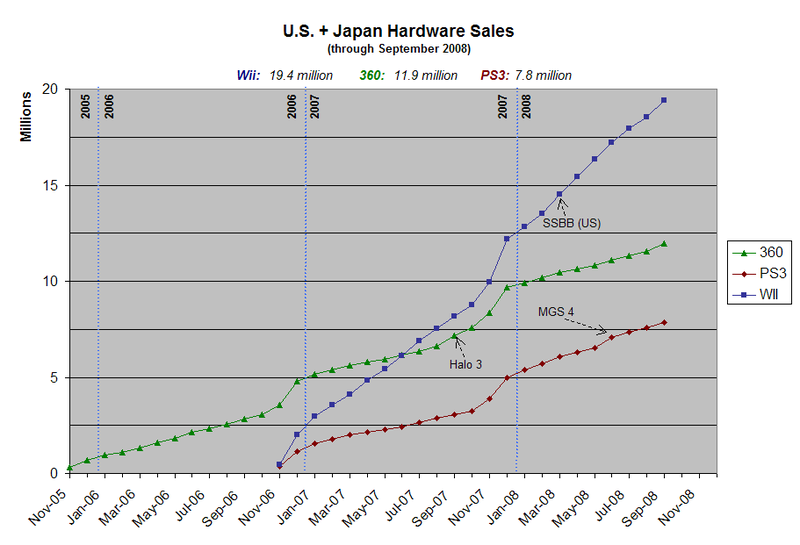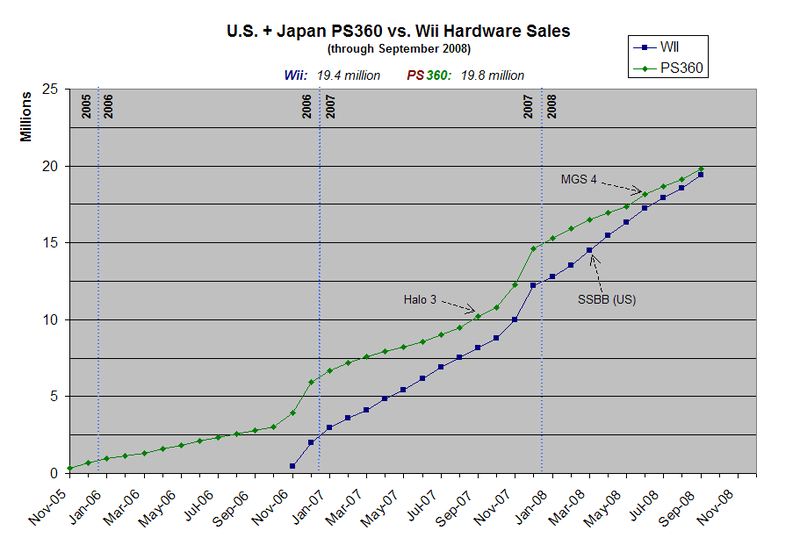donny2112 said:I think you're trying to say that the PS3/360 core audience is largely hardcore video game players who are typically males age 16-30, and the Wii's main advantage over that audience is its vastly stronger appeal to every other grouping to go along with the hardcore video game players who are typically males age 16-30. What comes out is this.
With no mention of 16-30 year old males/hardcore video game players also having that opinion which can be easily inferred as you believing that 16-30 year old males/hardcore video game players would not have that opinion.
I don't see how this is much different than someone saying "core gamers prefer the PS3/360," which is also something I'd argue is true. That doesn't mean zero core gamers like the Wii, just that a disproportionate number of "core" gamers prefer the PS3 or 360.
The difference being that my definitions are much less slanderous. Suggesting that "core" gamers don't like the Wii is, to me, an implicit attempt to suggest that only infants or philistines could possibly enjoy the system. The word "casual" has negative connotative stigmas now. By contrast,"women" and "the elderly" do not. It's much easier to condescend on the nebulous group we call "casuals" than it is on "women age 16-50," for example.
Possibly. Those labels would not include "women," "kids," or "the elderly," however.
The elderly might be more precisely defined as "peoples age 55 or older," just as "kids" can be broken down in to "boys age 3-15" or "girls age 3-15," but how is "women" not a precise label. I've seen long, drawn out arguments in here, where one person tries to insist person X isn't a core gamer, and then someone else insists they are. Is Mario still a core game? If you only play Mario and Pokemon, are you still a "core" gamer? I think many people would argue you aren't (although I wouldn't, personally). However, "women" is indisputable. We see plenty of arguments about who is or who is not a "core" gamer, but I can effectively guarantee that we will never have a debate over who or who is not a woman.
By shifting the verbiage to people groups, it becomes very easy to appear to be pigeon-holing an audience unless you painfully repeat all possible groupings again and again.
I agree with this. If you look back at my original post on this topic, so many pages ago, you'll notice that the only advantage I conceded to the "core/casual" differentiation is that it's simply easier to type. However, I would personally be completely willing to type out each and every group, if it meant more precise discussions.
If we could know that with the certainty that we know the sales numbers, it'd be interesting to see. However, I haven't found that to be the case.
I agree, but that's also a peril of "core" and "casual." Do we know if "core" players are buying, say, Mario Galaxy? We assume they are, but we have no certainty. We just kind of assume they are. It's entirely possible that outside of NeoGaf, 95% of all Mario Galaxy buyers are people we'd refer to as "casual." This is no different than my assumption that Wii Fit heavily tilts toward the female demographic. In fact, there is actually more empirical data for demographic focus than there is for "core/casual." I've never seen any polls ever that break down game or system sales by "core" or "casual" buyers, precisely because those terms are too nebulous to pin down. However, I absolutely have seen statistical break downs of purchasers by demographic group: Nintendo has produced data showing which gender/age groups most frequently purchase the DS in Japan, for example. The data is hardly complete, as you've noted, but at least there is something. Far better than nothing, which is what we have to support the "core/casual" division.
To summarize: neither the "core/casual" nor the demographic breakdown have absolute and complete empirical data to offer us. The difference is that in addition to the lack of empirical data, we don't even agree what "core/casual" mean, while we do agree what a "woman" is, or what "female age 3-15" is.


